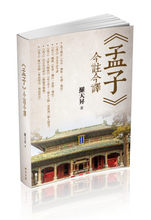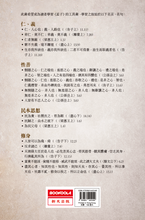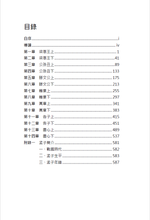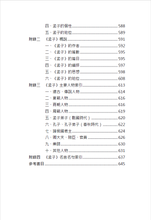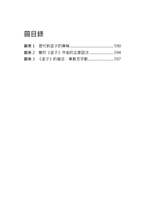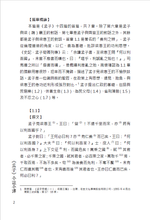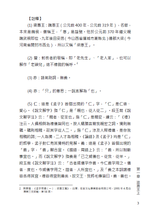
|
author |
Luo Tiansheng |
|
publishing house |
Xintian Publishing |
|
ISBN |
9789881445049 |
|
Classification |
Philosophy > Chinese Philosophy > Pre-Qin Philosophy and its Research |
|
price |
HK$188 |
|
Publication date |
June 2022 |
|
language version |
traditional Chinese |
|
Number of pages |
647 pages |
|
Edition |
first edition |
|
Binding |
Paperback/monochrome printing/14 x 21 x 3.35 cm |
|
Series / Series |
Modern annotations and translations of ancient texts |
brief introduction:
This book is Dr. Luo Tiansheng's fifth Chinese book. In order to facilitate readers to understand the background, metaphorical meaning and main explanation of the original text of "Mencius", this book has re-annotated the full text of "Mencius" in modern plain text, and added difficult characters. The words are appended with Cantonese Pinyin and Chinese Pinyin for easy reading. The layout of this book is aimed at a broad readership, hoping to arouse the interest of students at all levels in reading Chinese philosophy. The "Being New with the Ancient Series", which the author started writing in 2015, advocates that modern people should "clear the way" (promote wisdom), "sharp tools" (use wisdom as an effective tool), and "remain with the ancients" (learn from the experience of previous generations) and "for the new" (to innovate), hoping to contribute to the popularization of ancient books.
The "Four Books" of our country are "The Analects", "Mencius", "The Great Learning" and "The Doctrine of the Mean". The original text of "Mencius" is divided into fourteen parts, 260 chapters, and has more than 35,000 words. It is one of the important classics for studying Mencius's person, thoughts, and even Confucianism. "Mencius" and "The Analects of Confucius" are both genres that focus on recording words. The style of "Mencius" is more consistent than that of "The Analects of Confucius", with coherent writing and rigorous wording. It should be the product of careful editing by a small number of authors. "Mencius" was probably co-authored by Mencius and his disciples (such as Wan Zhang, Gongsun Chou, etc.) and was written from the middle to the end of the Warring States Period.
Mencius was born in the state of Zou in the middle of the Warring States Period. He was an important philosopher and thinker in Confucianism, and was revered as the "Little Sage". Mencius is a descendant of the Meng Sun family, a nobleman of the Lu State. He lost his father when he was young and was raised by his mother. According to "Historical Records . "The Biography of Mencius and Xunqing", Mencius was once a disciple of Zisi (Confucius's grandson Kong Ji). He was self-taught, well versed in ancient classics, and had a deep understanding of the principles of ancient sage kings. According to the book "Mencius", Mencius was good at using metaphors and fables to explain his views, and he was also good at distinguishing right from wrong in what others said ("Gongsun Chou" 3.2 "Zhiyan"). Mencius's character was upright, outspoken, and arguable ("Teng Wen Gong II" 6.9). Mencius was committed to petitioning for the people and proposing economic policies to improve people's lives ("The King of Liang Hui" 1.7 "Controlling the People's Property"). When Mencius was about forty years old, he traveled around the world. He first went to several small countries near Zou to lobby, and then traveled to Qi, Song, Wei and other large countries. Mencius took the promotion of kingship ("King Hui of Liang, Part 1" 1.3) and benevolent government ("Gongsun Chou, Part 1" 3.1) as his own duty. He was treated favorably by the princes, and he even served as the guest minister of King Xuan of Qi, giving lectures at the Jixia Academy of Qi State. In his later years, Mencius deeply felt that his political ideas were difficult to realize. After about twenty years of traveling around the world, he returned to the state of Zou in his sixties to teach as apprentices and write books and treatises with his students.
Mencius highly praised Confucius and believed that "since the beginning of the people, there has never been a Confucius" and "since the beginning of the people, there has been no one more prosperous than Confucius" ("Gongsun Chou" 3.2). Mencius claimed that "If you wish, then you should learn from Confucius" ("Gongsun Chou" 3.2), taking Confucius as a model for learning. Mencius believed that "a king will surely rise in five hundred years, and during this period there will be a person who is famous in the world" ("Gongsun Chou" 4.13), and "from Confucius to the present, it is more than a hundred years old, and the age of saints is not far away. How could it be so close to the residence of a saint, but how could it be nothing?" ("Exerting Hearts" 14.38) It is his duty to spread the teachings of Confucius. Mencius was living in troubled times, but he still upheld the perseverance spirit of "In today's world, who else would be better than me" ("Gongsun Chou" 4.13), and took it as his mission to advocate goodness of nature, benevolence and righteousness, kingship, and benevolent government, hoping to alleviate the suffering of the people.
About the Author:
Vincent Law holds a PhD in Business Administration from the Hong Kong Polytechnic University, an MBA (with distinction) from the City University of Hong Kong and a Bachelor of Science from the University of Hong Kong. He has worked in administrative management in private companies for a long time, and later joined a think tank to engage in public policy research. Currently, he is a senior lecturer in the School of Professional and Continuing Education of the Hong Kong Polytechnic University. He teaches subjects such as social sciences, management, and health. He has participated in a number of research projects in the fields of public policy, public participation, and education. In 2015, he began to write the "New Series with the Past". His Chinese works include "The Governance Wisdom of "University"" and "University . "The Doctrine of the Mean", "The Management Wisdom of the Doctrine of the Mean", "The Analects of Confucius".
Table of contents:
self-order i
Introduction ii
Chapter 1 King Hui of Liang
Chapter 2 His Majesty King Liang Hui
Chapter 3 Gongsun Chou (Part 1)
Chapter 4 Gongsun Chou’s Exit
Chapter 5 Teng Wengong enters
Chapter Six: Exit Teng Wen Gong
Chapter 7 Leaving Lou
Chapter 8 Leaving Lou
Chapter 9 Wan Zhang 1
Chapter 10 Wan Chapter 2
Chapter 11: Telling the Son
Chapter 12: Accusation
Chapter 13 Dedicated
Chapter 14 Do your best
Appendix 1 Introduction to Mencius
1. The Warring States Period 2. The Life of Mencius 3. The Chronicle of Mencius 4. Mencius’ Personality 5. The Status of Mencius Appendix 2 An Overview of "Mencius"
1. Author of "Mencius"
2. Number of chapters in "Mencius"
3. Chapters of "Mencius"
4. Arrangement of "Mencius"
5. The Thoughts of Mencius
6. The status of "Mencius"
Appendix 3 Index of Main Characters in "Mencius"
1. Ancient and legendary figures
2. Characters of Xia Dynasty
3. Characters of Shang Dynasty
4. Characters of Zhou Dynasty
5. Disciples of Mencius (Warring States Period)
6. Confucius and his disciples (Spring and Autumn Period)
7. Monarchs of vassal states
8. Qing Dafu, accompanying ministers, officials
9. Musicians
10. Other characters
Appendix 4 Index of Famous Quotes from "Mencius"
bibliography








